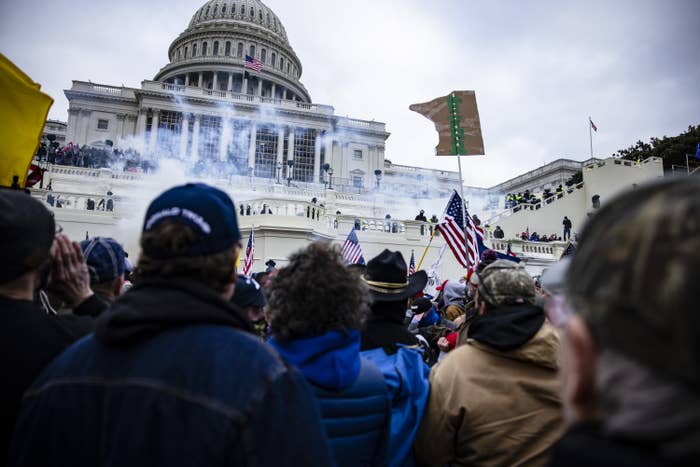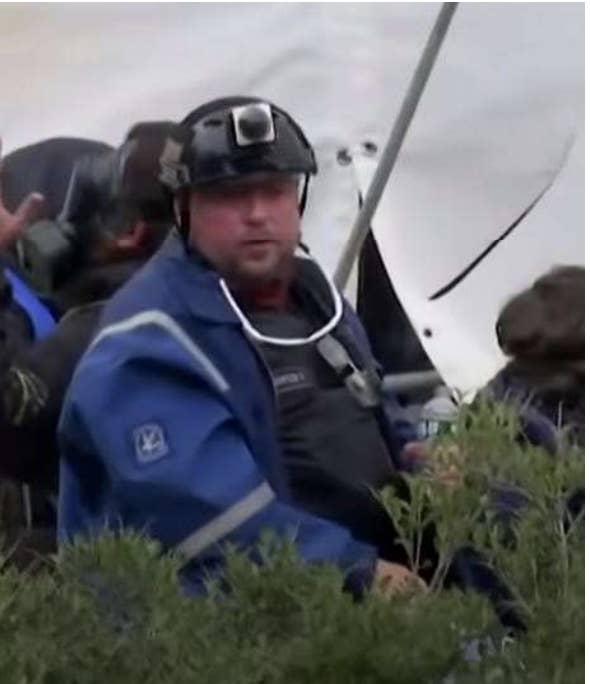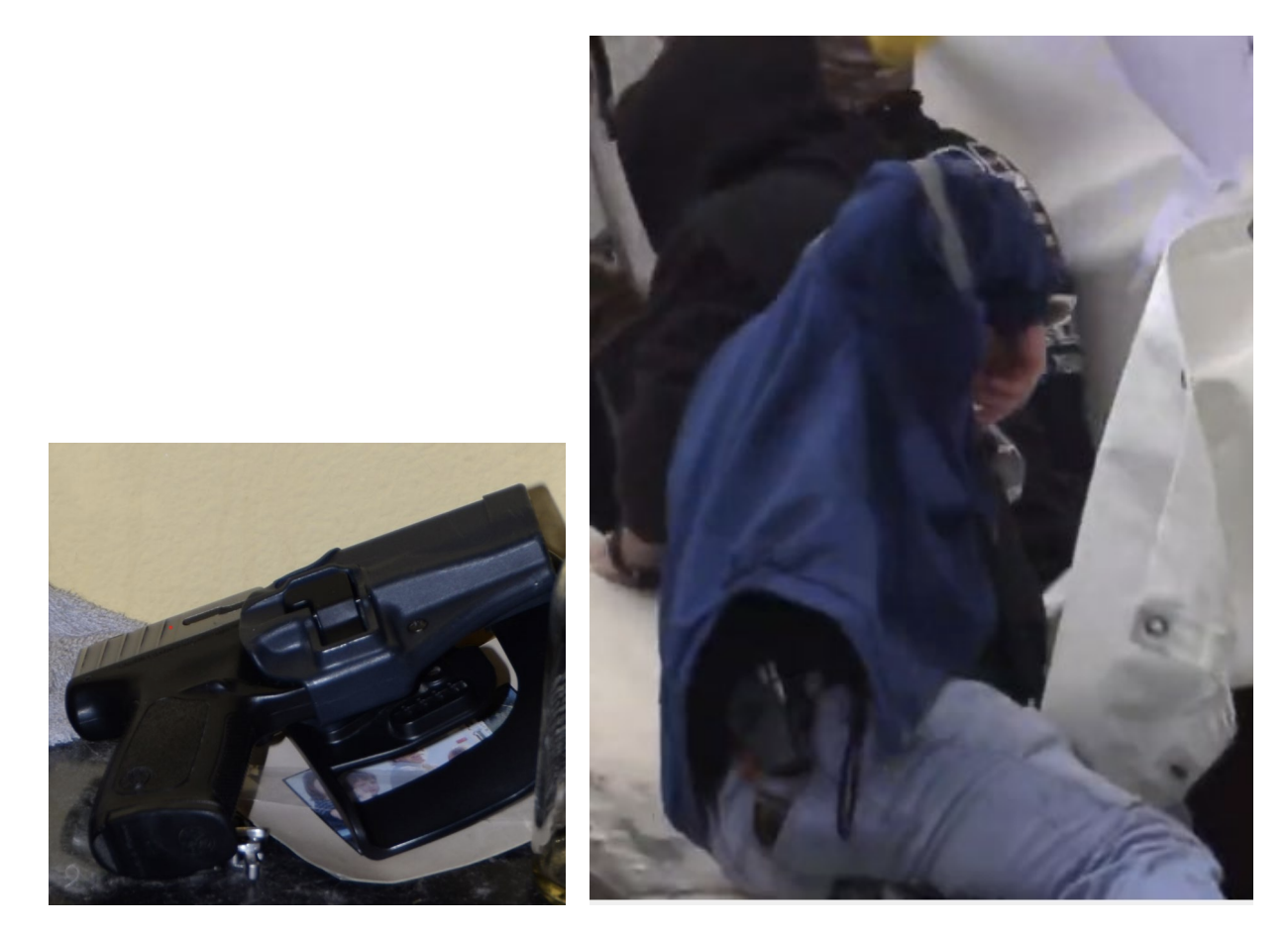
WASHINGTON — Jury selection is set to begin Monday in the case of a Texas man charged with bringing a handgun to the US Capitol during the Jan. 6, 2021, insurrection. It’s the first trial since the attack, a major milestone in the sprawling prosecution effort and a critical test of how the Justice Department’s strategy in these cases will play to a jury.
Guy Reffitt, 49, is accused of traveling to Washington with a rifle and a handgun and bringing the latter with him to the Capitol. He’s not accused of going inside the building, though; US Capitol Police officers are prepared to tell the jury that Reffitt attempted to make his way up a set of exterior steps as the riot unfolded and that it took a barrage of chemical spray, pepper balls, and other projectiles to turn him back. Once he returned home to Wylie, a suburb of Dallas, prosecutors allege, he warned his teenage children not to tell anyone about his trip to DC; his son reported him to the FBI.
Reffitt’s trial — how it unfolds and how it ends — will have ripple effects across hundreds of pending cases. Reffitt faces some of the same charges as many of the 750-plus defendants charged with storming the Capitol, including some who may be weighing plea deals or preparing for their own trials. The overarching context of the events of Jan. 6 that the jurors are likely to hear about — the events leading up to the attack, the extent of the violence, and the mob’s success in temporarily stopping Congress from certifying the results of the presidential election — is a shared feature. Other defendants, their lawyers, and federal prosecutors handling the rest of these cases will be closely watching to see how the jury responds.

But in other ways, Reffitt is an outlier. He’s one of only a handful of Jan. 6 defendants charged with having a firearm on the grounds, a key part of his case that could affect how the jury understands the stakes of his presence at the Capitol, versus others who are charged with joining the attack unarmed or wielding less obviously lethal weapons. The allegation that he threatened his family to obstruct the investigation is also unusual. The government is expected to bring up Reffitt’s connection to a local militia associated with the anti-government Three Percenters movement, another element that’s less common, although not unheard of, in these cases.
And unlike the vast majority of defendants, Reffitt isn’t accused of actually going inside the Capitol. That’s been a big dividing line between which of the thousands of people who stormed the complex have been charged and which of them haven’t.
But before jurors hear anything about Reffitt or the riot, they have to be seated. A small but growing number of Jan. 6 defendants, including Reffitt, have challenged holding trials in DC, citing the high proportion of registered Democrats and a pair of recent surveys, one organized by the federal public defender office, tracking how residents have consumed information about the insurrection and what opinions they already have about it. Judges have rejected these challenges so far.
The DC federal court has a long history of managing high-profile cases. But so much about the Jan. 6 investigation is unprecedented — the size and scope of it, how the Justice Department has applied various charges to try to hold individuals accountable for a collective attack on the Capitol, and the fact that it involved the first interruption of the peaceful transfer of power in US history.
Reffitt’s lawyer William Welch III and the prosecutors leading the case — Assistant US Attorneys Jeffrey Nestler and Risa Berkower — have prepared questions for prospective jurors aimed at understanding what they already know about Jan. 6, where they get their news and information from, and whether they or members of their close family have political views that could affect their ability to be fair.
There are trial dates on the calendar in more than four dozen cases, some featuring multiple defendants, including members of the Oath Keepers and Proud Boys extremist groups. Over the past year, prosecutors — sometimes with support from defendants and sometimes not — have asked for delays to the typical trial deadlines, citing the complexity of the investigation and challenges in collecting evidence and making it available to defense lawyers and their clients. Judges have approved these requests. The pandemic has also caused scheduling delays, since courthouse distancing rules limit how many trials they can hold.
Reffitt’s trial before US District Judge Dabney Friedrich is expected to last about a week. Judges have tried to prioritize scheduling trials for defendants who, like Reffitt, have been held in jail since their arrest. A relatively small proportion of people charged in the insurrection have been kept behind bars, with prosecutors arguing that they continued to pose a danger to others or a risk of interfering with the investigation. The majority of defendants in pretrial detention are charged with violence against police, conspiracy, or weapons offenses.

The Charges, Witnesses, and Evidence
Reffitt faces a five-count indictment. The first count accuses him of crossing state lines with two firearms — an AR-15 rifle and a Smith & Wesson pistol — with the intention of “unlawfully” using those weapons to support a “civil disorder.” The charge carries a maximum sentence of five years in prison.
The second count accuses Reffitt of obstructing an official proceeding and aiding and abetting — in this case, obstructing Congress’s certification of the Electoral College. Reffitt is one of a few dozen defendants who have raised legal challenges to prosecutors applying this charge to the events of Jan. 6. At least 10 judges to date, including Friedrich, have rejected their arguments. The obstruction count is one of the most serious charges that Reffitt faces in terms of potential prison time, carrying a maximum sentence of 20 years behind bars.
The third count charges Reffitt with illegally being in a restricted area with a “deadly or dangerous” weapon, the semiautomatic handgun that prosecutors intend to show he carried in a holster on his hip. They’ve included a photo from the Capitol in court filings that appear to capture him from behind, with a black object under his jacket identified as the holster. Without the weapons enhancement for the gun, the charge is a misdemeanor with a maximum sentence of one year in prison, but with the firearm element, it goes up to 10 years.
The fourth count also involves the “civil disorder” statute, this time accusing Reffitt of trying to interfere with police officers outside the Capitol during a civil disorder that “obstructed, delayed, and adversely affected commerce … and the conduct and performance of any federally protected function.” To prove the commerce piece, the government stated in a pretrial filing that it would tell the jury about how Safeway closed all 12 of its grocery stores in DC early on Jan. 6, and that Safeway reported between 18% and 47% less in sales and couldn’t receive shipments from a warehouse in Pennsylvania.
The fifth and final count accuses Reffitt of threatening his children; in January 2021, his son was 18 years old and his daughter was 16. According to the government, the pair are prepared to testify that after Reffitt returned from Washington, he told them they’d be “traitors” if they turned him in to investigators, and that he made a threat along the lines of “Traitors get shot.” This charge, like the congressional-obstruction count, has a maximum sentence of 20 years in prison.
Prosecutors have identified more than a dozen witnesses they’re prepared to call, including Reffitt’s children; a person identified as "R.H." who the government says is a member of Reffitt’s militia and received immunity to testify; US Capitol Police officers who will testify about engaging with Reffitt as he allegedly tried to go up the stairs outside; a Secret Service witness who will talk generally about efforts to get Vice President Mike Pence and his family to safety as the Capitol was breached; and a former congressional staffer who will testify about what Congress was doing that day.
The government’s evidence includes two guns that it contends Reffitt brought to DC, which the FBI found during a search of his home. One FBI special agent is set to testify about finding a holster in Reffitt’s room and how, in his opinion, it appears to be the same type of holster that prosecutors say was on Reffitt’s hip at the Capitol.
Other evidence on the government’s list, per pretrial filings, includes surveillance footage from the Capitol grounds that prosecutors say shows Reffitt in action; geolocation data from an app on Reffitt’s phone that tracked his movements before, during, and after Jan. 6; radio clips that recorded Capitol Police officers as they tried to stop Reffitt from allegedly getting past them; and text messages and messages sent via the Telegram app that the FBI pulled from Reffitt’s iPhone.

